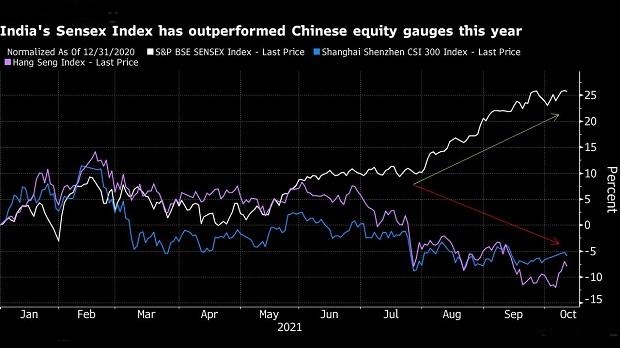India’s move to privatize flag carrier Air India Ltd. in its first big-ticket sale in almost two decades promises to further boost the appeal of the nation’s booming equity market just when China is intensifying its crackdown on private firms.
The high-profile sale puts investor spotlight on Prime Minister Narendra Modi’s aggressive reform agenda, as it shows that his plans to tap the private sector for the country’s assets are gaining traction. It could also pique interest in a number of state-run firms in which the government intends to divest stake, providing another potential catalyst to a market that’s rallied to successive all-time highs.
India’s equity markets, including initial public offerings, have drawn global attention and benefited from the ongoing regulatory clampdown in China as Beijing’s moves to tighten its grip on a swathe of sectors from technology to education to achieve President Xi Jinping’s vision of “common prosperity” has spooked global funds. Powered by record-low interest rates, a retail-investing boom and a spate of tech listings, India’s market capitalization has surged 37% this year to $3.46 trillion.
The Air India deal could lift sentiment toward the nation’s state-owned firms as investors have long been skeptical of their performance. Reflecting that, the S&P BSE PSU Index has mostly underperformed the benchmark S&P BSE Sensex since the global financial crisis. The valuation of the PSU index is also about a third of the broader benchmark index, near the lowest on record.
Modi’s government plans an IPO for Life Insurance Corp. of India, which is set to be the nation’s biggest listing. It also intends to sell stakes in several companies such as Bharat Petroleum Corp. Other potential divestment candidates include Container Corp., Shipping Corp., Dredging Corp., Steel Authority of India Ltd., Hindustan Copper Ltd. and IDBI Bank Ltd.
The deal is not just a signal for improving regulatory climate for private enterprises in India, but will boost the cheap valuations of state-run companies on expectations of getting private owners sooner rather than later.
The last big-ticket program to sell major Indian companies to private players was in 2002 when Reliance Industries Ltd. bought India Petrochemicals Co., a unit of Vedanta Ltd. purchased a majority stake in Hindustan Zinc Ltd. and Suzuki Motor Corp. gained management control in Maruti Suzuki India Ltd.



